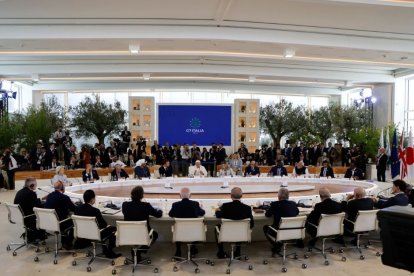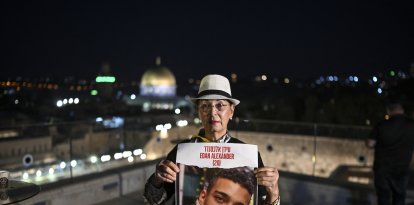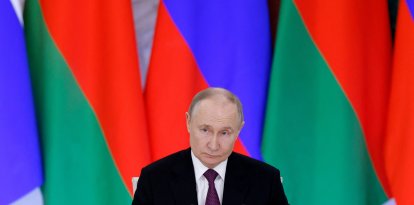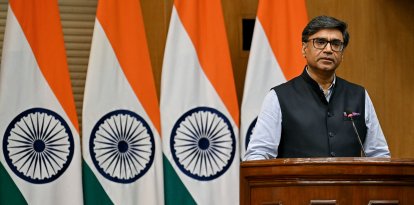Support for Ukraine, concerns about China, warnings for Iran and weak support for Israel: All the points of the final G7 declaration
From southern Italy, leaders of the international forum highlighted the need to strengthen international norms and turned their attention to various conflicts of global interest.

(Ludovic Marin / AFP)
This Friday, in southern Italy, G7 leaders adopted a 36-page declaration that addresses various global crises and key issues on the international agenda. The document highlights the group's attention to conflicts such as Ukraine and the Middle East and addresses crucial issues such as China, migrant trafficking, the Red Sea, Iran and artificial intelligence.
The statement reaffirms the G7's commitment to democratic principles, universal human rights and social progress, as well as multilateralism and the rule of law. It emphasizes the importance of strengthening international rules and norms to ensure "more effective, inclusive and equitable global governance that reflects our changing world."
Ukraine
Regarding Ukraine, the G7 promised continued support "for as long as necessary," announcing plans to unlock approximately $50 billion from frozen Russian assets.
They also stressed the need for Russia to take responsibility for the damage caused, which amounts to more than $486 billion according to the World Bank, by keeping Russian assets frozen until international legal obligations are met.
Conflict between Hamas and Israel
In the conflict between Hamas and Israel, the leaders strongly condemned the terrorist attacks by Hamas and other groups against Israel, supporting the legitimate right of the Jewish State to defend itself. However, they urged Israel to refrain from the ground operation in Rafah and to “fully comply with its obligations under international law in all circumstances, including international humanitarian law.”
Furthermore, the G7 condemned Hamas' continued use of civilian infrastructure for its military activities. The leaders actively supported the agreement proposed by President Biden to reach a ceasefire in Gaza, the release of hostages and the delivery of humanitarian assistance, urging Hamas to accept it fully.
Iran
The statement underlined the urgent need for Iran to cease its destabilizing actions. They reaffirmed the ban on developing nuclear weapons and urged the country to stop enriching uranium without credible civilian justification. In addition, it was warned of possible rapid and coordinated consequences if Iran supports Russia in the Ukraine war or transfers military technology.
The leaders also demanded an end to malicious activities in the Middle East and condemned human rights violations, urging Iran to end arbitrary detentions and harassment of its citizens.
Call to China
G7 leaders called for direct engagement to manage differences and address global challenges such as climate change and health security. They expressed concerns about unfair trade practices by China and policies that negatively impact global sectors. In addition, they raised concerns about human rights in China, including the situations in Tibet, Xinjiang and Hong Kong, urging China to act responsibly in cyberspace and respect international standards.
Red Sea
The G7 condemned the Houthis' recurring attacks on international and commercial ships in the Red Sea and the Gulf of Aden. They emphasized the need to cease these illegal attacks and demanded the immediate release of the Galaxy Leader and its crew by the Houthis. In addition, he reaffirmed the right of countries to defend their ships in accordance with U.N. Security Council Resolution 2722 and international law.
The G7 warned that continued Houthi attacks in the Red Sea could destabilize the region, block freedom of navigation, and put U.N.-led peace efforts in Yemen at risk.
Venezuela
The G7 expressed deep concern about Venezuela's political, economic and humanitarian crisis and the lack of progress in implementing the October 2023 Barbados Agreement. They urged Venezuela to fully implement the agreement to guarantee competitive and inclusive presidential elections on July 28, with the presence of comprehensive and credible international electoral observation missions.
In addition, they demanded an end to threats against the opposition and the immediate release of all political prisoners.
Collaboration with Africa
The document also outlines the leaders' commitment to strengthening their support for African countries, focusing on sustainable development, democratic governance and global stability. They also emphasize the need to improve infrastructure, private investment and domestic resource mobilization. They also advocate for an international financial architecture adapted to current challenges, including climate change and sustainable development.
“We will work with the IMF, the World Bank, and other key parties to bring this plan forward, with a view to realize it for pilot countries by the end of 2024,” the text indicates.
Sustainable development and food security
The G7 committed to strengthening Multilateral Development Banks (MDBs), such as the World Bank, to play a more effective and broader role in providing financing and technical assistance to developing countries. In this context, it was announced that the World Bank will increase its lending by $70 billion over the next decade. This increase aims to support the implementation of projects that promote sustainable development and contribute to achieving the Sustainable Development Goals (SDG), addressing critical areas such as reducing extreme poverty, inequality, climate change and improving access to essential services such as education and health.
The G7 also launched the "Apulia Food Systems Initiative," designed to overcome structural barriers and promote resilient and sustainable agricultural and food systems globally, with a focus on improving the sustainability and productivity of supply chains and addressing inequalities of gender.
Emphasis is placed on the interrelationship between climate change and food systems, underlining the need for coherent policies and investments to transform these systems, especially in low-income countries.
The commitment to mobilize up to $600 billion towards sustainable and resilient infrastructure by 2027 was also reaffirmed, focusing on Africa and the Indo-Pacific. Specific initiatives are highlighted to improve the coordination of green investments and strengthen public-private partnerships, focusing on quality infrastructure that meets international standards.
Environment
The leaders discussed the climate, pollution and biodiversity loss. Additionally, they discussed global efforts to preserve forests and oceans, as well as end plastic pollution. These efforts are based on several objectives, such as reducing emissions and transitioning to renewable energy.
Migration
The G7 committed to addressing migration in partnership with countries of origin and transit, focusing on the root causes of irregular migration and improving border management. The "G7 Coalition to prevent and counter the smuggling of migrants" was launched.
Artificial Intelligence
Leaders will deepen their cooperation to manage the risks and benefits of artificial intelligence. An action plan on using AI in the world of work will be launched and the International Code of Conduct for Organizations Developing Advanced AI Systems will be developed.
Economic growth
The document also highlights the commitment to global economic growth, maintaining financial stability and investing in digital and clean energy transitions. In addition, they committed to strengthening the rules-based multilateral trading system and implementing a fairer and more stable international tax system.
Other relevant topics
The G7 statement addressed the crisis in Haiti and reaffirmed the commitment to Libya's stability, independence, territorial integrity and national unity. It expressed concern about deteriorating security in the Sahel, ongoing conflicts in Sudan and the Belarusian regime's involvement in Russia's war against Ukraine. Additionally, it renewed the call for the complete, verifiable and irreversible dismantling of all North Korean weapons of mass destruction and ballistic missiles, among other relevant international issues.
RECOMMENDATION





















